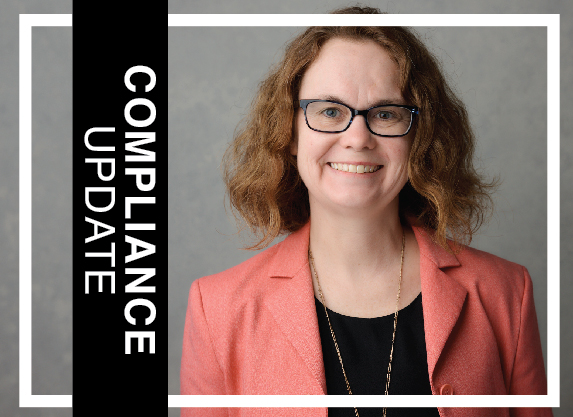|
InfoSight Highlight
Stay on top of federal regulatory changes with InfoSight's quarterly videos which provide condensed overviews of timely regulatory topics that can help the credit union and board of directors understand and stay informed on compliance changes. The videos provide information and updates on deposit accounts, lending, credit union operations, and additional resources available to help you keep in compliance with these changes and updates. You can find these videos here. Q3 compliance update included developments related to deposit accounts, lending updates and credit union operations update. Remember – InfoSight is a dues supported (free) resource available to DakCU affiliated credit unions. FinCEN Alert – Terrorist Activities The Financial Crimes Enforcement Network (FinCEN) recently issued FIN-2023-Alert006 which can be found here. FinCEN is urging financial institutions to be vigilant in identifying suspicious activity relating to financing Hamas and reporting such activity to FinCEN. As explained in the Alert, “As part of a whole-of-government response, the U.S. Department of the Treasury is taking all steps necessary, including by issuing this Alert and engaging with foreign counterparts, to deny Hamas the ability to raise and use funds worldwide. Building on previous actions against Hamas, Treasury’s Office of Foreign Assets Control (OFAC) recently designated numerous Hamas members, operatives, and financial facilitators located in Gaza and elsewhere, including Sudan, Türkiye, Algeria, and Qatar.” The Alert includes a number of red flags to assist credit unions in detecting, preventing, and reporting potential suspicious activity related to Hamas’s terrorist financing activity. A few of these red flags include:
Check Before Donating The IRS recently provided a reminder to beware of fake charities. “The Internal Revenue Service today warned taxpayers to be wary of criminals soliciting donations and falsely posing as legitimate charities. When fake charities scam unsuspecting donors, the proceeds don’t go to those who need the help and those contributing to these fake charities can’t deduct their donations on their tax return.” The IRS recommends that those who wish to make donations should use the Tax-Exempt Organization Search (TEOS) tool on IRS.gov to help find or verify qualified, legitimate charities. With the TEOS, people can:
The FBI also provides helpful tips on the topic, including:
CDFI’s Small Dollar Lending Program Webinar The National Credit Union Administration (NCUA) will be hosting a webinar on November 8 with the Community Development Financial Institution regarding the CDFI Small Dollar Loan Program. Online registration for this webinar, “The CDFI Fund’s Small Dollar Loan Program for Credit Union Applicants, is now open. CDFI Fund associate program manager Julie Sandler and Amy Apitz, management and program analyst at the Fund, will discuss how CDFI-certified credit unions use award funds to help unbanked and underbanked members build credit, acquire affordable capital, and gain greater access to the mainstream financial system. A credit union must be CDFI-certified to apply for this program or be a co-applicant with a CDFI certified institution. Employee Retention Credit – Withdrawal Process The Internal Revenue Service (IRS) recently announced the details of a special withdrawal process to help those who filed an Employee Retention Credit (ERC) claim and are concerned about its accuracy. As we have discussed in prior Memo articles, the IRS has issued several warnings to taxpayers to use extreme caution before applying for the ERC as aggressive maneuvers continue by marketers and scammers. This new withdrawal option allows certain employers that filed an ERC claim but have not yet received a refund to withdraw their submission and avoid future repayment, interest and penalties. Employers that submitted an ERC claim that’s still being processed can withdraw their claim and avoid the possibility of getting a refund for which they’re ineligible. Per the announcement - the IRS created the withdrawal option to help small business owners and others who were pressured or misled by ERC marketers or promoters into filing ineligible claims. Claims that are withdrawn will be treated as if they were never filed. The IRS will not impose penalties or interest. Employers can use the ERC claim withdrawal process if all of the following apply:
Taxpayers who are not eligible to use the withdrawal process can reduce or eliminate their ERC claim by filing an amended return. To take advantage of the claim withdrawal procedure, taxpayers should carefully follow the special instructions at IRS.gov/withdrawmyERC. Marketers and scammers have already revised their ERC pitches following the Sept. 14 moratorium announcement. Some are pushing employers who submit an ERC claim into agreeing to costly up-front loans in anticipation of a refund. The IRS urges taxpayers to avoid these loans and also learn the warning signs of ERC scams. Comments are closed.
|
The MemoThe Memo is DakCU's newsletter that keeps Want the Memo delivered straight to your inbox?
Archives
July 2024
Categories
All
|
|
Copyright Dakota Credit Union Association. All Rights Reserved.
2005 N Kavaney Dr - Suite 201 | Bismarck, North Dakota 58501 Phone: 800-279-6328 | [email protected] | sitemap | privacy policy |





